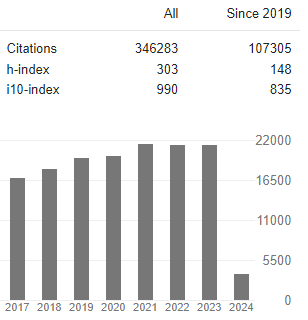Verification of Goldbach's Strong and Weak Conjectures at Infinity Using Basic and Accessible Mathematics
Abstract
Bouchaib Bahbouhi
This article uses two basic arguments: an even number denoted E' is either E' = 2n x E (E being even) or it is the sum of two or more even numbers. In the first case, E' = 2 n x E, this paper shows that primes p < E/2 and if E = p + q (q being prime and > E/2) and if E' = p + qx (qx being prime) then qx = (2n - 1)p + 2n q with n idicating the rank of the multiple such that n = 0 for E, n = 1 for 2 x E, n = 2 for 22 x E and so on. Therefore, 2n x E = p + (2n - 1)p + 2n q. E' and E must share one common prime p < E/2 for this equation to be verified. The primes qx follow an exponential curve with correlation coefficient R2 ≈ 1. This proves that the prime p close to 0 has an infinity of possible equidistant primes qx and therefore supports verification of Goldbach's conjecture to infinity. In the second case, where E' is the sum of two or more even numbers, the paper shows in a simple way that an odd number and a prime number can be the sum of a minimum of three primes. This indicates that weak conjecture of Goldbach is deduced from the strong one. Finally, the paper discusses the significance of these results for proving the truth of both Goldbach's conjectures to infinity.



